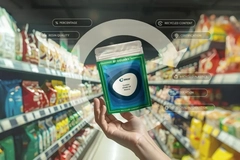
Saudi Basic Industries Corporation (SABIC) has launched a new blow-moulding grade of HDPE (high density polyethylene) to make bottles for milk, other dairy products and juices in ‘tough’ conditions.
Saudi Basic Industries Corporation (SABIC) has launched a new blow-moulding grade of HDPE (high density polyethylene) to make bottles for milk, other dairy products and juices in ‘tough’ conditions.
The Dutch arm of the petrochemical giant (2011 turnover: $50.64bn) said that the new grade was principally targeted at bottles for UHT (ultra-high temperature) and sterilised milk produced on high-speed extrusion blowmoulding lines, especially in southern countries.

SABIC HDPE B5260ULS – which can be either coloured on the blow moulder or by using compounding equipment – was one of the few materials that had the necessary processing properties required by converters to run on equipment typically used for UHT and sterilised milk, the firm claimed.
A melt-flow rate (MFR at 2.16kg) of 2g/10 minutes* and a broad molecular weight distribution ensured good performance during extrusion and blowing, with the grade suitable for mono- and multi-layer constructions.
Gerrit-Jan Bekink, technical marketing engineer (HDPE) for SABIC, based in Sittard, The Netherlands, said: “HDPE B5260ULS – ULS stands for ultra-long shelf life – is a high purity grade that features good organoleptic properties [relating to potential transfer of packaging taste, odors to foods or beverages].
"[These] are especially important when using in-bottle sterilisation, where the packaging as well as the product are subjected to tough thermal and mechanical conditions," he added.
The new grade’s balanced mechanical properties – stiffness, impact and environmental stress crack resistance (ESCR) – were also well-suited for a demanding segment, Bekink added.
Mario Scholle, business manager HDPE for SABIC, Sittard said: “HDPE used in this application [UHT and sterilized milk] is not a commodity product; numerous processors are not in a position where they can quickly and easily change supplier.”
He added: “Through its unique technology SABIC has developed a product which could fit our customers’ needs.”
*Melt flow index (MFI) measures the ease of flow of a thermoplastic polymer, defined as the mass thereof in grams flowing through a capillary over 10 minutes, driven by gravimetric weights.
Processors require a polymer with an MFR high enough for it to be easily formed in a molten state, but not so high that this jeopardises the finished product’s mechanical strength.
Source: Saudi Basic Industries Corporation
All content and features on this website are copyrighted with all rights reserved. The full details can be found in our privacy statement
Subscribe to our newsletters
By continuing to browse our site you agree to our Privacy Statement












